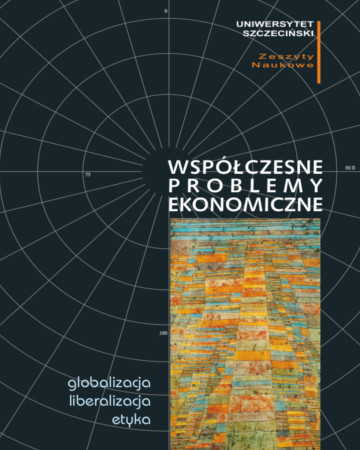
ISSN: 2081-9579
eISSN: 2353-2815
OAI
DOI: 10.18276/wpe.2017.14-09


Issue archive /
nr 14 (2017)
Information ethics in the perspective of the knowledge-based economy
| Authors: |
Anna
Waligórska-Kotfas
Państwowa Wyższa Szkoła Zawodowa w Koninie, Katedra Finansów i Logistyki |
| Keywords: | knowledge-based economy information ethics information services |
| Data publikacji całości: | 2017 |
| Page range: | 8 (133-140) |
| Klasyfikacja JEL: | D80 O33 Z13 |
Abstract
The transformation of the modern economy paradigm towards the knowledge-based economy (KBE) has led to the creation and expansion of new products and services. Simultaneously, the socio-economic shift interdependent on the information processing and knowledge diffusion results in ethical dilemmas. The reflections on the topic of this paper are firstly focused on the SWOT analysis of the socio-economic issues corresponding with the emergence of the KBE. Furthermore, information ethics in macro as well as micro perspectives discussed. Finally, some ethical responsibilities of the KBE’s beneficiaries are considered.
Download file
Article file
Bibliography
| 1. | AIIP (2015). Code of Ethical Business Practice. Retrieved from: http://www.aiip.org/About/Code-of-Ethical-Business-Practice (1.10.2015). |
| 2. | Berardi, F. (2005). What Does Cognitariat Mean? Work, Desire, Depression. Cultural Studies Review, 11 (2), 57–63. DOI:http://dx.doi.org/10.5130/csr.v11i2.3656. |
| 3. | Castells, M. (2003). Galaktyka Internetu: refleksje nad Internetem, biznesem i społeczeństwem. Poznań: Rebis. |
| 4. | Castells, M. (2013). Społeczeństwo sieci. Warszawa: Wydawnictwo Naukowe PWN. |
| 5. | Comor, E. (2010). Digital prosumption and alienation. Ephemera: Theory & Politics in Organization, 10 (3/4), 439–454. |
| 6. | Dijk, J.A.G.M. van. (2005). The Deepening Divide: Inequality in the Information Society. Thousand Oaks: Sage. |
| 7. | Fiut, I., Habryń, M. (2001). Społeczność akademicka wobec możliwości wykorzystania Internetu w procesie pracy. In: L.H. Haber (ed.), Mikrospołeczność informacyjna na przykładzie miasteczka internetowego Akademii Górniczo-Hutniczej w Krakowie (pp. 127–164). Kraków: Uczelniane Wydawnictwa Naukowo-Dydaktyczne AGH. |
| 8. | Floridi, L. (2006). Information Ethics, its Nature and Scope. SIGCAS Computers and Society, 36 (3), 21–36. |
| 9. | Floridi, L., Sanders, J.W. (2003). Internet Ethics: the Constructionist Values of Homo Poieticus. In: R.J. Cavalier (ed.), The Impact of the Internet on Our Moral Lives (pp. 195–214). New York: State University of New York. |
| 10. | ICIE (2015). International Centre for Information Ethics. Retrieved from: http://icie.zkm.de/research (22.11.2015). |
| 11. | IFLA (2015). IFLA Code of Ethics for Librarians and other Information Workers. Retrieved from: http://www.ifla.org/news/ifla-code-of-ethics-for-librarians-and-other-informationworkers-full-version (5.12.2015). |
| 12. | Jemielniak, D. (2012). The New Knowledge Workers. Cheltenham: Edward Elgar Publishing. |
| 13. | Kietliński, K. (2009). Moralność gospodarki opartej na wiedzy. Warszawa: Wydawnictwo Uniwersytetu Kardynała Stefana Wyszyńskiego. |
| 14. | Martin, M.W. (2000). Meaningful Work: Rethinking Professional Ethics. New York: Oxford University Press. |
| 15. | Materska, K. (2007). Informacja w organizacjach wiedzy. Warszawa: Wydawnictwo SBP. |
| 16. | PLA (2005). Librarians Profession Code of Ethics (Kodeks Etyki Bibliotekarza i Pracownika Informacji). Retrieved from: http://www.sbp.pl/dla_bibliotekarzy/przepisy_prawne/kodeks_etyki_bibliotekarza (29.11.2015). |
| 17. | Prensky, M. (2009). Homo Sapiens Digital: From Digital Immigrants and Digital Natives to Digital Wisdom. Innovate: Journal of Online Education, 5 (3). Retrieved from:http://nsuworks.nova.edu/innovate/vol5/iss3/1 (22.11.2015). |
| 18. | Russo, F. (2012). The homo poieticus and the bridge between physis and techne. In: H. Demir (ed.), Luciano Floridi’s Philosophy of Technology (p. 65–81). Dordrecht: Springer Science. DOI: 10.1007/978-94-007-4292-5_4. |
| 19. | SCIP (2015). Code of Ethics for CI Professionals. Retrieved from: https://www.scip.org/CodeOfEthics.php (29.11.2015). |
| 20. | Sherman, Ch., Price, G. (2001). The Invisible Web: Uncovering Sources Search Engines Can’t See. Medford: Information Today Inc. |
| 21. | Sienkiewicz, P., Nowak, J.S. (ed.) (2008). Społeczeństwo informacyjne: krok w przód, dwa kroki w tył. Katowice: Polskie Towarzystwo Informatyczne – Oddział Górnośląski. |
| 22. | Waligórska-Kotfas, A. (2015). Big Data: implikacje etyczne gromadzenia i przetwarzania informacji w organizacjach. Prace Naukowe Wyższej Szkoły Bankowej w Gdańsku, 40, 181–194. |
| 23. | Webster, F. (2014). Theories of the Information Society. New York: Routledge. |